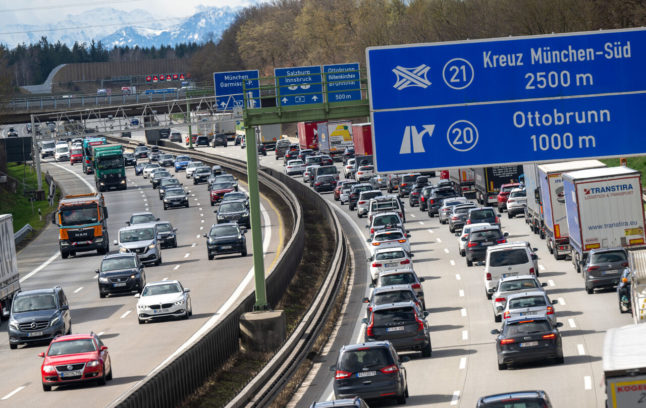On the roads
As many people will be travelling by car over Easter to take short trips or to visit relatives – especially on Gründonnerstag (Maundy Thursday) – the roads are expected to be full.
The German Automobile Association (ADAC) is expecting a lot more traffic than usual on Germany’s motorways over the Easter weekend and is warning drivers to be prepared for longer journey times from Thursday, April 6th.
The worst days for traffic are expected to be Maundy Thursday (April 6th) and Easter Monday (April 10th), especially in Rhineland-Palatinate, Saxony-Anhalt, Bremen, Lower Saxony, Mecklenburg-Western Pomerania and Saarland, where Monday marks the end of the school holidays.
READ ALSO: Which German cities are the worst for traffic?
The quietest day for travelling on the roads is expected to be Easter Sunday.
These are the routes expected to be hit by the most congestion from the April 6th to 10th:
A1 Bremen – Hamburg and Dortmund – Cologne
A1/A3/A4 Cologne ring road
A3 Würzburg – Nuremberg – Passau
A5 Karlsruhe – Basel
A6 Mannheim – Heilbronn – Nuremberg
A7 Hanover – Flensburg and Würzburg – Ulm – Füssen/Reutte
A8 Stuttgart – Munich – Salzburg
A9 Nuremberg – Munich
A10 Berlin Ring
A61 Mönchengladbach – Koblenz – Ludwigshafen
A81 Stuttgart – Singen
A93 Inntaldreieck – Kufstein
A95/B2 Munich – Garmisch-Partenkirchen
A99 Munich bypass
There are currently more than 1,000 motorway construction sites in Germany, so wherever you are in the country, you’ll likely experience some congestion at some point. Here is a current overview of the motorway construction sites from ADAC.

Those journeying to neighbouring countries – such as Austria and Switzerland – are also likely to encounter traffic jams.
In Austria, the Tauern, Inntal and Brenner motorways are expected to be hit by congestion as well as the Gotthard route in Switzerland.
Motorists travelling abroad should also be aware of the different country-specific winter tyre regulations, as some – for example in Austria – are still valid until mid-April.
Train travel
Though the rail transport union EVG and the services union Verdi have said that they will refrain from industrial action on the railways over the Easter weekend, some parts of the country will still see a fair amount of disruption thanks to construction works and higher passenger volumes.
READ ALSO: Reader question: Will there be more strikes in Germany over Easter?
Deutsche Bahn has closed one of the most important connections in the western Ruhr region for a fortnight from March 31st to April 14th for construction works. As a result, all train services between Essen and Duisburg are suspended and many local and long-distance trains between Essen, Bochum and Dortmund and between Düsseldorf and Duisburg have been cancelled, with passengers in most cases having to make do with replacement bus services.
According to Deutsche Bahn, there will be changes to the normal timetable on the following lines during the Easter holidays: RE1, RE2, RE3, RE6, RE11, RE14, RE19, RE42, RE44, RE49, RB33, S1, S3 and S9.
The tracks from Dortmund to Münster and from Oberhausen to Arnhem in the Netherlands are also closed during the Easter holidays due to construction work.
Renovation works in the Rhine-Main region in northern Hesse are also likely to cause problems for rail passengers, as two central lines are closed due to construction work: in Frankfurt, the S-Bahn will not run between Hauptwache, Südbahnhof and Offenbach-Ost for three and a half weeks from March 31st. Traffic on all lines except the S7 will be interrupted in Frankfurt.
The ICE line from Kassel to Fulda will be completely closed for eight months, from April 1st – affecting long-distance routes such as the north-south connection from Hamburg to Munich.
In Munich, Deutsche Bahn will be carrying out construction work on the S-Bahn main line over the Easter weekend, which will result in timetable changes and cancellations between April 6th and 11th.
Air travel
Though airport strikes will also be on hold over the Easter weekend, most airports throughout the country are expected to be busy, as many airports brace for the first big holiday rush of the year amid continuing staffing shortages.
Hamburg Airport expects around 270,000 passengers per day over the Easter holidays and is offering travellers the option to book a fixed 15-minute slot for security checks via the airport website before departure.
Munich Airport is expecting around 100,000 passengers each day from Friday to Sunday, and Frankfurt Airport is slated to welcome around 180,000 passengers. Passengers are therefore advised to arrive at the airport in good time before departure, with well-sorted hand luggage.
What about other countries?
In Spain, airport ground staff have been striking every Monday, Tuesday, and Thursday since February 27th and are set to continue until April 13th, affecting Easter travel.
The affected airports are Alicante, Almería, Barcelona, Burgos, Gran Canaria, Huesca, Lanzarote, Madrid, Málaga, Murcia, Reus, Salamanca, Tenerife Sur, Valencia, Valladolid, and Zaragoza.
In the UK, some 3,000 employees working at Terminal 5 in London’s Heathrow Airport, will be striking until April 9th.
This has prompted British Airways, the terminal’s main occupant, to cancel some 300 flights.



 Please whitelist us to continue reading.
Please whitelist us to continue reading.
Member comments